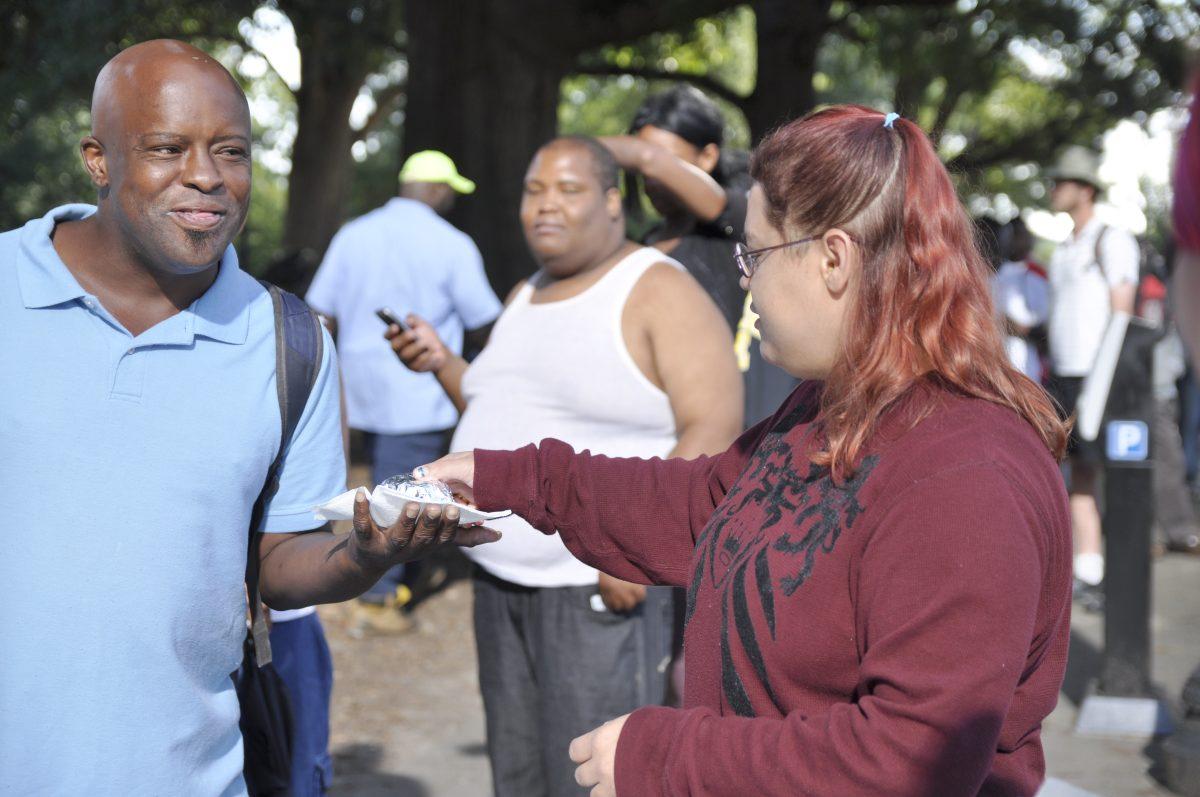Raleigh Police Department’s enforcement of an ordinance that disallowed community members to hand out food to the needy in Moore Square made national news last month. Now, police have decided not to enforce the law.
Serving food without a permit in Raleigh’s public parks has been against the law for many years, but police allowed volunteers to distribute food to the homeless until last month. The sudden enforcement raised ethical questions by many and prompted a quick response from the city. After meetings held by the Law and Public Safety Committee and the Raleigh City Council, city officials decided last week to temporarily revert back to their policy and not enforce the law.
Government officials will continue to hold meetings to determine a solution that they feel better fits the whole community, including possibly distributing the food at alternate sites.
“The City Council’s Law & Public Safety Committee decided at its Aug. 28 meeting to recommend that, while the City works on a long-term solution, the City will continue its current policy of not enforcing the ordinances related to, or arrest any individual or groups involved in, the food distribution to those less fortunate in Moore Square,” according to a news release issued by the City of Raleigh Public Affairs Department.
Police Chief Cassandra Deck-Brown attended the committee meeting. According to transcribed notes issued by the RPD, Deck-Brown said that there were a lot of factors to take into account and the department was doing its best to accommodate all involved.
Wake Area Missions Ministries is a community movement that attempts to gather churches and organizations to help serve the needy. It hosts meetings and think-tank sessions to try to get people together and try to solve the hunger problem in Raleigh.
Richard Fitzgerald, an organizer of WAMM, as well as the director of fundraising and agency relations for the Raleigh Rescue Mission, said that the police had allowed WAMM and other organizations to distribute food for a long time by “turning a blind-eye” to the ordinance. Despite this, he and other organizers had already begun to plan alternate sites, called “care points,” to offer food.
“There were a lot of folks in the woods, in talking with people, that they didn’t want to go into the park because of all the—just everybody being there,” Fitzgerald said. “They didn’t like the crowds—they didn’t like all of that so they weren’t getting anything.”
Fitzgerald said that having scattered sites in Raleigh would be an advantage because it would be closer to where the needy actually live and they could walk to it.
According to Deck-Brown’s statement, the police informed groups that distributing points such as the Salvation Army’s had recently moved.
“We simply made folks aware that the Salvation Army had moved, educated the citizens and saw our partners from WAMM providing information about other food distribution sites as well,” Deck-Brown said at the committee meeting.
Deck-Brown said there was never any intention to make arrests.
Some, like a local business owner who spoke with The News & Observer, have expressed displeasure with the situation and hope that these distributors move to a new location.
“The legacy of Moore Square is it’s become a designated herding place for the indigent and homeless,” Al Brothers said to the News & Observer. “My big question is, ‘Why Moore Square?’ ”
One of the issues that many are concerned with in Moore Square, which got the attention of Raleigh police, was a problem with liter.
“WAMM was not only trying to do good by giving the food, we were also trying to help work with the city and cleaning it up for everybody’s sake,” Fitzgerald said.
Fitzgerald said that WAMM worked together with the Raleigh Parks, Recreation and Cultural Resources Department to synchronize trash pick-up schedules, but the trash canisters still filled up.
“I think what happed is there is so much food there that the amount of food got ahead of the pick-up schedules and it ended up, at the end of the day, that there was a pile of it left,” Fitzgerald said.
Fitzgerald said that WAMM wanted to find a solution because he doesn’t want to hurt the people who need the community groups the most.
“Let’s not hurt the people that we’re trying to help,” Fitzgerald said. “They get blamed when we leave and it’s a mess.”
Deck-Brown said that the police department hopes to work with other community groups and businesses to find the best possible solution.
“Our focus has always been on achieving progress that works for all involved,” Deck-Brown said.
Raleigh’s first city meeting to discuss future alternatives will be held at the Marbles Kids Museum Sept. 16 at 7 p.m.








